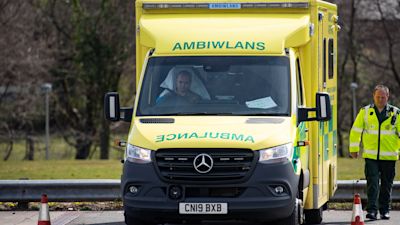Ambulance response times for life threatening calls in Wales joint slowest on record

Ambulance response times for life-threatening calls were their joint slowest on record in Wales last month, according to figures released by the Welsh Government on Thursday.
Just half of ambulances arrived at red calls - those where someone is in an immediately life-threatening condition - within eight minutes, 0.7% lower than the previous month.
It's also 2.2% lower than September of last year.
That's despite a target of 65% of ambulances making it to the most serious call-outs inside a target of eight minutes.
Ambulance services are continuing to feel the strain of increased demand. It was the sixteenth consecutive month where, on average, they responded to more than a hundred of the most serious calls each day.
Almost 35,000 calls in total were made to the ambulance service in September across Wales, a slight decrease from August.
Emergency callouts for ambulances are placed in three categories, with red being the most serious.
Those categorised as "amber" are serious but not life-threatening, while "green" incidents are classed as non-urgent.
The proportion of calls which were deemed the most serious also increased last month, rising to 10.2%, an increase of 6.4% on the previous month.
There have been questions raised about response times in some cases, with services being criticised for being too slow on occasion.
It comes as the mother of a two-year-old boy faced an eight hour wait for an ambulance despite her son, Tobias, being "completely unresponsive" after having a seizure at home in Cardiff on Monday.
Georgia Faith Johnson decided to drive to hospital herself, and after Tobias took a turn for the worse during the journey, was advised by the call handler to find a defibrillator.
He was eventually blue-lighted to the University Hospital of Wales by an ambulance which just happened to be passing the scene.
Ms Johnson told ITV News the experience had left her feeling "completely helpless".
Elsewhere in the Welsh NHS, the average time spent in emergency departments shortened in September but remains high at two hours and forty-nine minutes.
However, three quarters of a million people remain on waiting lists for treatment in Wales.